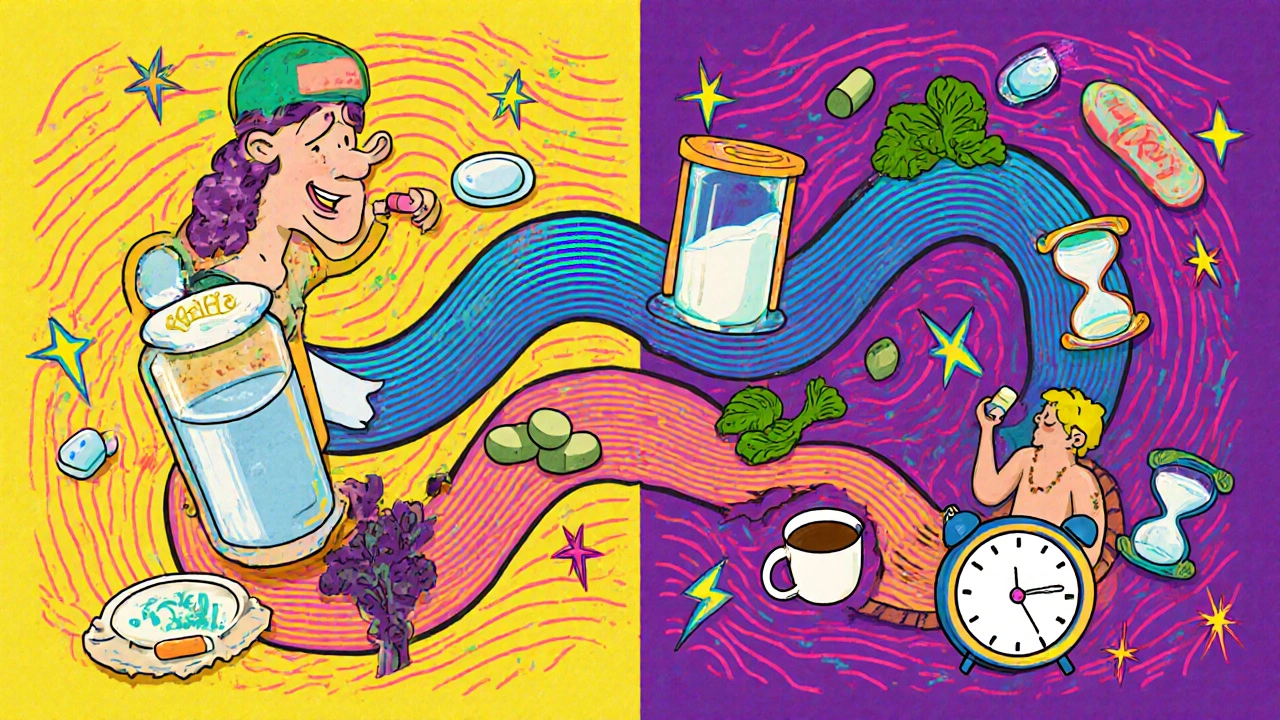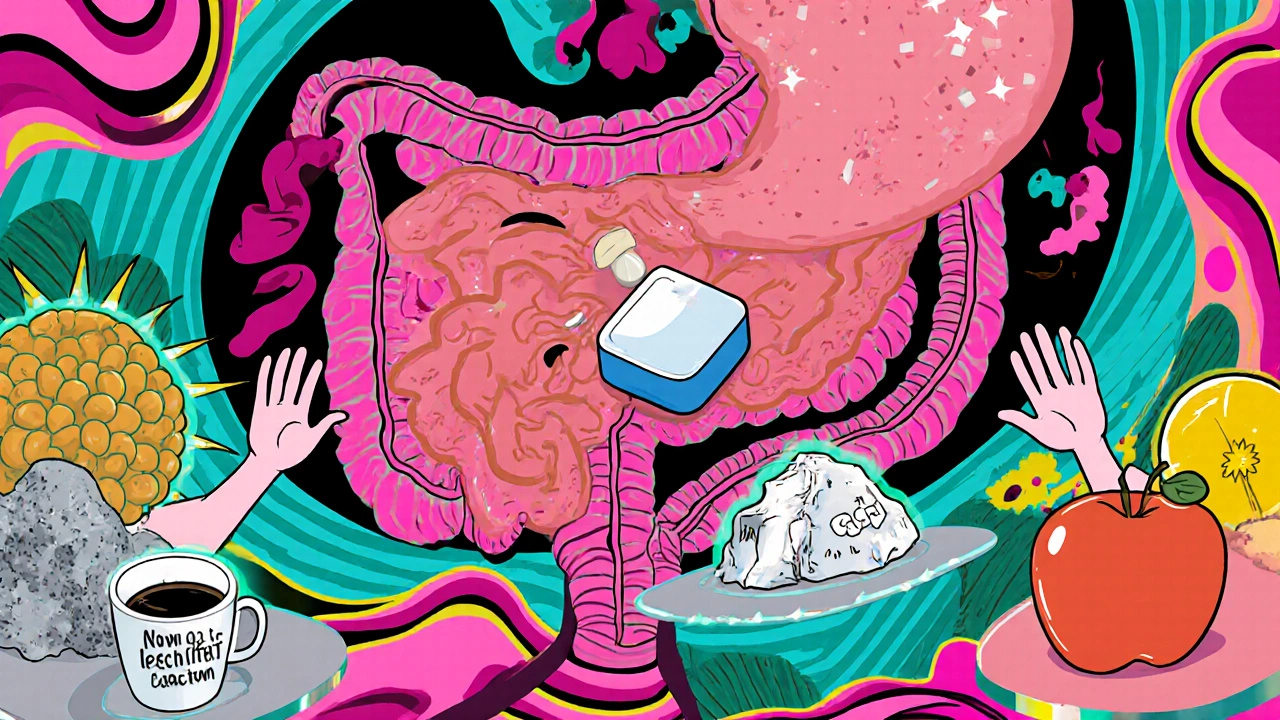Levothyroxine and Your Diet: Foods to Eat and Avoid

Taking levothyroxine correctly isn’t just about popping a pill at the same time every day. What you eat - and when you eat it - can make or break how well your body absorbs the medication. If you’ve been told your thyroid levels aren’t improving despite sticking to your dose, your diet might be the hidden culprit.
Why Food Matters with Levothyroxine
Levothyroxine is a synthetic version of the thyroid hormone T4. Your body needs it to regulate metabolism, energy, temperature, and heart rate. But this medication doesn’t work if it’s not absorbed properly in your gut. And many common foods and drinks interfere with that absorption.
Studies show that certain substances can reduce levothyroxine absorption by up to 55%. That’s not a small drop - it’s enough to throw your hormone levels out of balance, leaving you tired, gaining weight, or feeling depressed even when you’re taking your pill.
The key? Take your levothyroxine on an empty stomach, wait at least 30 to 60 minutes before eating, and avoid specific foods and supplements for several hours after.
Foods and Drinks to Avoid Within 4 Hours of Taking Levothyroxine
Some items bind to levothyroxine in your stomach and gut, preventing it from entering your bloodstream. Here’s what to steer clear of for at least four hours after your dose:
- Calcium-rich foods - Dairy products like milk, cheese, yogurt, and fortified plant-based milks. Even a single glass of cow’s milk can cut absorption by 20-30%.
- Iron supplements and iron-rich foods - Red meat, spinach, lentils, and iron-fortified cereals. Iron and levothyroxine compete for the same absorption pathway.
- Soy products - Tofu, soy milk, edamame, and soy-based protein powders. Soy contains compounds that block thyroid hormone absorption.
- Coffee and espresso - Even black coffee can reduce absorption by up to 55%. The exact reason isn’t fully understood, but it’s consistent across studies.
- Fiber-rich foods - Whole grains, bran cereals, beans, and high-fiber vegetables. Too much fiber speeds up digestion and reduces time for absorption.
- Walnuts - One study showed walnuts significantly lowered levothyroxine levels in patients who ate them within hours of dosing.
- Antacids and proton pump inhibitors - Medications like Tums, Maalox, omeprazole, and ranitidine change stomach pH and interfere with absorption.
It’s not that you can never eat these foods again. It’s about timing. If you love your morning oatmeal with soy milk and a handful of walnuts, shift that meal to lunch or dinner - at least four hours after your pill.
What You Can Eat With Levothyroxine
There’s no need to overhaul your entire diet. Focus on what you can eat safely, especially during the critical window around your dose.
- Water - The best way to take your pill. Use plain, cool or room-temperature water. Avoid sparkling water if it contains calcium.
- Fruits - Apples, bananas, berries, oranges, and grapes are safe. Avoid grapefruit if you’re on other medications, but it doesn’t interfere with levothyroxine.
- Vegetables (non-fiber-heavy) - Lettuce, cucumbers, zucchini, bell peppers, and tomatoes are fine. Save the broccoli and Brussels sprouts for later in the day.
- Lean proteins - Eggs, chicken, turkey, and fish don’t interfere. A boiled egg for breakfast after your 60-minute wait is perfectly safe.
- Non-soy plant-based milks - Almond milk, oat milk, and rice milk (check labels for added calcium) are generally okay if consumed after the 4-hour window.
Many people find it easiest to take levothyroxine first thing in the morning, wait an hour, then have a simple breakfast: toast with jam, a banana, and a cup of tea (without milk). That’s it. No need to overcomplicate.
Timing Matters More Than You Think
Most doctors tell you to take levothyroxine on an empty stomach. But what does that really mean?
Research from the Journal of Clinical Endocrinology & Metabolism shows that taking levothyroxine at least 60 minutes before breakfast gives the most consistent absorption. Taking it 30 minutes before eating still works - but absorption drops slightly.
Some people prefer taking it at bedtime. This works too - as long as you haven’t eaten for at least three to four hours and you avoid nighttime snacks. Bedtime dosing can be easier for people who struggle with morning routines or who drink coffee right after waking up.
Consistency is everything. If you take it at 7 a.m. on weekdays and 11 a.m. on weekends, your thyroid levels will bounce around. Pick a time that fits your life - and stick to it.

Supplements and Medications That Interfere
It’s not just food. Many supplements and over-the-counter meds can mess with levothyroxine absorption:
- Calcium supplements - Even 1,000 mg of calcium carbonate taken within four hours can reduce absorption.
- Iron supplements - These are a major offender. If you’re anemic and need iron, take it at least four hours after your thyroid pill.
- Multivitamins - Many contain iron and calcium. Take them at night, or choose one without those minerals.
- Cholesterol-lowering drugs - Cholestyramine and colestipol bind to levothyroxine. Separate doses by at least four to six hours.
- Seizure medications - Phenytoin and carbamazepine can speed up how fast your body breaks down levothyroxine, requiring a higher dose.
Always check with your pharmacist before starting any new supplement. A quick call can save you months of fluctuating thyroid levels.
What to Do If Your Levels Still Don’t Improve
If you’re doing everything right - taking your pill on an empty stomach, avoiding interference foods, taking it at the same time every day - but your TSH is still high, talk to your doctor about these possibilities:
- Switch brands - Not all levothyroxine brands are identical. Some people absorb one brand better than another. Synthroid, Levoxyl, Tirosint, and generic versions differ slightly in fillers.
- Try Tirosint - This is a softgel capsule with no fillers like lactose or dyes. It’s more stable and absorbs better in people with gut issues or who take multiple meds.
- Check for gut problems - Celiac disease, H. pylori infection, and inflammatory bowel disease can all reduce absorption. If you have bloating, diarrhea, or unexplained weight loss, ask for testing.
- Recheck your dose - Your needs change with age, weight, pregnancy, or menopause. A dose that worked five years ago might not be enough now.
Don’t assume your diet is the only issue. But don’t ignore it either. Most people see improvement within 4-6 weeks of fixing their food timing.
Real-Life Example: Sarah’s Story
Sarah, 52, from Leeds, was taking her levothyroxine at 7 a.m. and having a smoothie with soy milk, spinach, and chia seeds right after. Her TSH stayed stubbornly high at 8.5 (normal range: 0.4-4.0). She felt exhausted and gained 10 pounds in six months.
Her endocrinologist asked about her morning routine. When she mentioned the smoothie, they suggested switching to water, waiting an hour, then having toast and jam. She also moved her iron supplement from morning to bedtime.
Three months later, her TSH dropped to 2.1. She had more energy, lost the extra weight, and stopped needing afternoon naps.
It wasn’t magic. It was timing.

Quick Daily Routine to Maximize Levothyroxine Absorption
Here’s a simple, doable plan that works for most people:
- Take levothyroxine with a full glass of water as soon as you wake up - before brushing your teeth or drinking coffee.
- Wait 60 minutes before eating or drinking anything else.
- Have breakfast: fruit, eggs, toast, or lean protein. Avoid soy, dairy, and high-fiber cereals.
- Take supplements (iron, calcium, multivitamins) at lunch or dinner, at least 4 hours after your pill.
- At night, eat your soy, walnuts, or fiber-heavy meals. No need to rush.
That’s it. No complicated diets. No expensive supplements. Just smart timing.
What About Alcohol and Caffeine?
Alcohol doesn’t directly interfere with levothyroxine absorption. But heavy drinking can affect liver function, which plays a role in hormone metabolism. Moderation is best.
Coffee? Avoid it for at least 60 minutes after your pill. If you absolutely need caffeine in the morning, try decaf or wait until after your first meal.
Tea is fine - as long as it’s not with milk. Green tea has no known interaction, and some studies even suggest it may support thyroid health in moderation.
When to Call Your Doctor
Reach out if:
- Your symptoms (fatigue, weight gain, cold intolerance) return or worsen.
- You’ve changed your diet or started a new supplement and your levels haven’t improved.
- You’re pregnant or trying to conceive - thyroid needs often increase during pregnancy.
- You’re switching brands or pharmacies and notice a change in how you feel.
Don’t adjust your dose yourself. Even small changes can cause big effects. Your doctor will order a TSH blood test to guide any adjustments.
Can I take levothyroxine with water?
Yes - plain water is the best way to take levothyroxine. Avoid sparkling water if it contains added calcium. Don’t use tea, coffee, milk, or juice unless your doctor says it’s safe.
How long after eating can I take levothyroxine?
If you take levothyroxine at night, wait at least 3-4 hours after your last meal. If you take it in the morning, wait 60 minutes before eating. Taking it after food reduces absorption significantly.
Is it okay to chew levothyroxine tablets?
No. Levothyroxine tablets should be swallowed whole. Chewing or crushing them can alter how they’re absorbed. If you have trouble swallowing, ask your doctor about Tirosint, a softgel capsule.
Does soy milk interfere with levothyroxine?
Yes. Soy contains isoflavones that block thyroid hormone absorption. Avoid soy milk, tofu, and soy protein within 4 hours of your dose. Almond or oat milk are safer alternatives.
Can I take levothyroxine with my other medications?
Some medications interfere - especially calcium, iron, antacids, and cholesterol drugs. Space them at least 4 hours apart from levothyroxine. Always check with your pharmacist before starting anything new.
Why does my TSH keep going up even though I’m careful?
If you’re following diet and timing rules but your TSH is still high, you may need a dose adjustment, a different brand of levothyroxine, or testing for gut issues like celiac disease. Talk to your doctor - don’t assume it’s your fault.
Levothyroxine works best when your body gets it cleanly - without interference. That means a little planning, but not a drastic change. Small adjustments to your eating habits can make a huge difference in how you feel every day. You don’t need to give up your favorite foods. Just move them to the right time of day.
Lilly Dillon
October 28, 2025 AT 16:31Finally someone laid this out clearly. I’ve been taking mine at night for two years now and my TSH finally stabilized. No more afternoon crashes. Just water, pill, and bed. Simple.
Shiv Sivaguru
October 29, 2025 AT 17:26This is the most overblown, fear-mongering diet guide I’ve ever read. You’re telling me I can’t have my soy latte and oatmeal? What’s next, banning oxygen because it interferes with thyroid absorption? People are turning medication into a cult. Chill.
Gavin McMurdo
October 30, 2025 AT 01:57Let’s be real: if your body can’t absorb a synthetic hormone because you had a banana, you’re not broken - your medical system is. We’ve turned pharmacology into a ritualistic ballet where you must bow to the pill at precisely 7:03 a.m., or else your thyroid becomes a political prisoner. And yet, somehow, we still think this is science.
Meanwhile, in Germany, they prescribe natural desiccated thyroid and let people eat whatever they want. But no - we need to micromanage your breakfast because Big Pharma loves a compliant, coffee-deprived patient.
Also - walnuts? Really? That’s your big threat? Next you’ll say sunlight interferes with absorption because it makes you feel better. Please.
But hey - if waiting an hour for toast makes you feel in control, go for it. Just don’t pretend this is biology. It’s behavioral compliance dressed up as endocrinology.
Jesse Weinberger
October 30, 2025 AT 08:44wait so if i take my pill at night and eat soy for dinner im fine? but if i eat soy at 7am and take pill at 7:05 i die? thats not science thats superstition. also who even eats walnuts in the morning? who even has time for this? i just swallow the pill and go. if i feel like crap its because the doc gave me the wrong dose. not because i had oatmeal.
Emilie Bronsard
November 1, 2025 AT 02:30This was super helpful. I switched to taking it at night and it made a noticeable difference. No more bloating after breakfast too.
John Bob
November 2, 2025 AT 23:29There’s no evidence that coffee reduces absorption by 55%. That number was pulled from a single 2008 study with 12 subjects. The FDA hasn’t validated it. This entire post is fear-based marketing disguised as medical advice. You’re being manipulated into believing you need to restructure your entire life for a drug that’s not even standardized across brands. Wake up.
Alex Grizzell
November 4, 2025 AT 14:00you got this 💪 seriously though - just pick a time and stick with it. i used to take mine with my coffee and felt like a zombie. switched to water + 60 min wait and now i have energy to actually enjoy my morning. no magic, just consistency. you got this.
George Johnson
November 6, 2025 AT 03:39So if I take my pill at 7 a.m. and eat a bowl of oatmeal with soy milk at 7:01, I’m basically poisoning myself? Sounds like the kind of rule you’d find in a cult manual. I’ll keep drinking my soy latte. My TSH is fine.
Rodrigo Ferguson
November 8, 2025 AT 01:36The notion that dietary interference with levothyroxine absorption is a clinically significant phenomenon is, frankly, an oversimplification bordering on the pathological. One must consider the pharmacokinetic variability inherent in the human gastrointestinal milieu, the confounding influence of gastric motility, and the absence of standardized, longitudinal, double-blind trials controlling for macronutrient composition. To reduce endocrinological management to a dietary checklist is to engage in medical populism - a disservice to both science and the patient.
Mickey Murray
November 8, 2025 AT 09:15Look, if you're eating soy milk and walnuts right after your pill and wondering why you're still tired, you're not a victim of bad science - you're just lazy. This isn't rocket science. Take the pill on an empty stomach. Wait. Eat later. Stop making excuses. Your thyroid doesn't care about your 'morning routine.' It just wants to work.
Kevin McAllister
November 9, 2025 AT 16:40Who wrote this? Some pharma shill? Soy is a superfood. Coffee is a cultural right. And now we’re being told to avoid both because some lab rat in a white coat says so? This is how they control us - make us afraid of our own breakfasts. Wake up, sheeple. The government doesn’t want you to feel good - they want you dependent on pills and compliance.
Marcia Martins
November 9, 2025 AT 18:24Thank you for writing this. I’ve been struggling for years and this finally made sense. I switched to almond milk and now I’m sleeping better. You’re not alone 💛
Robert Bowser
November 10, 2025 AT 19:35I take mine at night and haven’t had a problem. I eat soy and coffee whenever. My doctor says my levels are perfect. Maybe the rules aren’t for everyone?